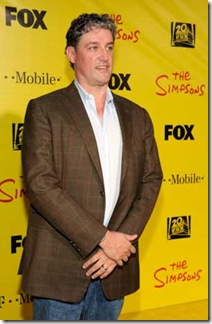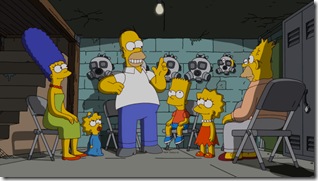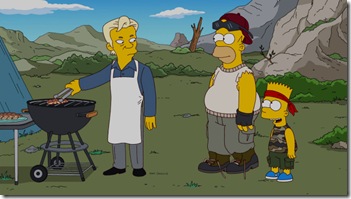The Simpsons [Fox, Sundays, 8/7C] airs its 500th episode Sunday. That’s a lot of detentions and lines for The Bartman. The show has spawned comics, a movie and even a dance [do The Bartman]. It also has another distinction – its showrunner, Al Jean, has been with the show – albeit not always as showrunner – for its entire run!
Earlier this week, Jean talked with a group of bloggers/journalists about The Simpsons’ longevity.
Al Jean: Glad to have you with us and we are really excited about this episode.
Just a short question and then a real question—you’re always listed as Detroit. Did you grow up in Detroit or in one of the suburbs?
Jean: Farmington Hills.
My main thing is I just wanted your original impressions, when you were hired as a writer had they done that first episode, the pilot show, yet or not? What was your thought of the potential of The Simpsons when you first joined it?
Jean: What they sent us—they were looking for writers to turn it into a half-an-hour show—was Tracy Ullman shorts compiled on a videocassette. I thought they were really funny. The job was only two days a week. It was turned down by several people before us, but I liked Life in Hell very much and it was a chance to work for Jim Brooks so I thought it was going to be a good job. I’d be lying if I said I’d be here answering questions about episode 500. They would’ve locked me up, but that’s it. I just thought it was a really exciting opportunity.
Hello, Al. Congratulations, by the way. I didn’t see his name in the callout for the conference call, but is Julian Assange in this episode and if so, why is he in it? And are there any concerns about having him in it when other people on the Fox Network have openly called for his assassination?
Jean: He is in the episode. Obviously he’s a controversial figure and that was discussed before we agreed to let him do it. It’s a funny cameo and it makes no judgments about the larger case about him. So yes, he’s in it and we had to record him over the phone. It was a very kind of cloak and dagger thing, but we’ve been specializing in finding people who can’t be found so we thought it’d be especially unique for the 500th episode. I don’t think he was on the 500th episode of Gunsmoke.
Just to go back a few months, if you could mention, how close did the talent come to leaving last October? It seemed a little bit murky. I know everyone was talking about cutting salaries and then suddenly the show was renewed for two years. I just wondered if there was a real go-down-to-the-wire aspect to that?
Jean: I think it was less of a close call than people thought reading the coverage. What happens is the cast has two, three, four-year contracts and when they expire then they’re renegotiated. It’s not a holdout. It’s not a walkout. It’s the way business works.
This was actually a very early signing. The network had said that the cost of the show that we were doing was prohibitive, and as you can see shows like House did come to an end because of cost. They said if you can get it down to a certain number we’d love to keep going as long as you can, and we did. Going through the whole budget, including the cast, and everybody just loves it so much that they said, ‘To keep it going we’ll work with what we see as a genuine concern.’
Did Fox ever give any serious consideration to pulling the plug on the show?
Jean: We had an episode which we just aired last Christmas called ‘Holidays of Future Past.’ Had we ended the series that would’ve been the last episode. We were prepared to do that, but in my opinion, having been privy to it, I don’t think it ever really got close to that point.
I am wondering if there’s any guest starts that you met personally that you have any kind of favorite anecdotes about?
Jean: I can tell you one. I didn’t meet him. He recorded it and I heard it over the phone. But we had a table read where Ted Nugent was calling in from, as I understand it, a hunting expedition where he did his part in between going up in a helicopter to shoot things.
We had a line at the beginning where it said, ‘Man’s voice,’ which is him. In other words, we didn’t see him yet and it just said, ‘Man’s voice,’ and he didn’t read it. We said, ‘No, it’s you. You should read that line.’ He said, ‘Sorry guys, you [effed] up.’ So that got a huge laugh. Someday I hope to meet him. Preferably not when he’s shooting from a helicopter.
And I’m wondering too if it ever were—to follow up on an earlier question someone else asked—If it ever came to pass that any of the talent left for any reason, since it’s such a long running show, would you find someone else who could possibly perform the voice in the same way?
Jean: I personally wouldn’t want to do the show without the people that we have. I mean they’re obviously integral to it and we’ve done so many episodes I can’t conceive of it without them. Had they not signed, we would’ve stopped the show.
The Simpsons has just transcended boundaries and become an international sensation. Did you ever expect that? And why do you think people all over the world have just really grasped this brilliantly dysfunctional family?
Jean: Part of it is I think the world hates America so we’ve really cashed in on that. And I think that, more seriously or somewhat seriously, that it’s about a family, and no matter where you go people have a family and it’s usually a family that doesn’t work perfectly. So it relates very well to anyone who looks at it.
And of course because it’s animated we’re able to use local talent. In countries that don’t speak English the people who do the voices of the characters become big stars. I was talking to the syndicator from Germany. He sad sadly the woman who voiced Marge passed away and when they aired the new voice 16,000 people wrote in saying, ‘Why did you get rid of the old Marge?’ They had to take out an ad explaining what had happened. The local Simpsons are extremely popular.
Also you’ve worked on so many episodes and have been the showrunner, do you have a particular favorite or is there one standout episode? I know it’s very difficult to ask, but is there one particular episode that you have a particular affection for at all?
Jean: It’s almost like the first and the last. I love the first Christmas show and I loved that last one I just referred to, ‘Holidays of Future Past.’ You love the beginning and you still love what you’re doing so I would name those two. But there are a lot. If I said there are 500 shows and I only have one favorite that would be a lot of shows I didn’t like.
Al, you mentioned 500 shows. How much longer do you think you can do this? How many more stories can you tell?
Jean: We’re definitely going to do a total of 559. That’s what the new deal is for, but I honestly think—because again, it’s a show with a really rich universe, many characters. It centers on a family, which is extremely universal. I don’t know where the end is. I’ve jokingly said, ‘Why not 1,000? Why not 2,000?’ But that’s sounds a preposterous to me now as 500 did then so I really don’t know.
You mentioned that one episode you thought would’ve been the last one had there not been a deal. Do you have one in your pocket that will be the last one if it happens?
Jean: No. We spent it. Right [now] there is no clue and no plan. It’s not a show like Lost where we’re going to hope to answer a fundamental question with our last episode. I’m sure whatever we do it’ll want to have a little bit of closure but also just be really emotional and true to the series.
With Julian Assange on the show, what do you think it says about the impact that The Simpsons has had on society and popular culture as a whole?
Jean: It’s hard to exactly tell, but I think it’s just one of the most recognized—for lack of a better word—literary accomplishments in history. Really you go around the world and someone like Julian Assange says, ‘I’d like to be on The Simpsons,’ which is just something I never would’ve conceived of 20 years ago, and the people that we’ve gotten to meet and work with in that time are just unbelievable. It’s really like the kind of people you meet in a dream are the ones that we’ve gotten to work with.
With over 500 episodes, how would you say The Simpsons are different today, as a family, than The Simpsons of 1989?
Jean: I think the world maybe has gotten a little bit more post-apocalyptic in its thinking. You see a lot of sort of dire prognostications, bleak visions of the future. So I think that the show reflects that a little bit, but we were never that optimistic about big institutions and governments. We were always more interested in the relationship of the family.
You just said that you never thought that someone like Julian Assange would say they wanted to be on The Simpsons. Did he contact you or did you guys go after him?
Jean: I had heard through Matt Groening, and I don’t know who told him, that Mr. Assange was interested in being on the show. So we had our casting director, Bonnie Pietila, who also tracked down Banksy and Thomas Pynchon, try to locate him and she did. If there’s a missing person you want to find, she’s the person to contact.
You had said earlier that you’ve become experts in finding people that can’t be found. You mentioned Thomas Pynchon. Is there anyone you’re particularly proud of? A get that you never thought would happen that you guys did find them?
Jean: The Banksy thing I thought was amazing and I never even met him or talked to him. It was all via e-mail so he could be a woman for all I know. We had Tony Blair on the show. That still boggles my mind.
Why do you think The Simpsons has been able to last for 500 episodes?
Jean: I think there are several reasons. I think that they way that the show was conceived by Matt and Jim. It is just such a rich universe and such a story that people like to see repeated. I think the fact that the characters don’t age is key. I think if Bart was really 40 and living on his parent’s couch it would be too sad. And we just work really hard; everybody on the show just really takes it seriously and acts like it’s the first season and we’re fighting for our lives.
I was wondering if you could talk about just Julian’s personality, what it was like to work with him? And also like a dream guest star you would love to have in the future?
Jean: It was a very brief phone call where mostly I was talking to the engineer who was talking to him. So I just briefly said, ‘Thanks for doing the show,’ and he asked when it would be on. There was really very little interaction. He was in a different country. I have no idea where he was. I know more about him than Banksy, but very little more than that.
I’m sorry; what was the second question?
Any dream guest stars you would love to book in the future?
Jean: Sandy Koufax would be a great one.
So last week you had two dedicated fans that broke a world record by watching The Simpsons over 86 hours straight.
Jean: … it was sort of stopped so it wouldn’t go too long, but I think they could’ve gone a lot further. My wife and I visited and they were really—they really like the show.
So how did that come about, that whole competition?
Jean: It was just an idea from Fox where they thought in conjunction with the 500th episode they’d have the marathon. I think to actually watch all 500 would be beyond human capacity. I certainly wouldn’t want to be walking into the room saying, ‘Hey, I wrote … 498.’ They were really cool and my congratulations to both of them.
Do you have any plans to kill off any characters this upcoming season?
Jean: No. We did it a little bit with Maude Flanders and Bleeding Gums Murphy. I think that people don’t want to see us kill off Grandpa. They want him to be around. They want this universe to sort of stay roughly the same just the way that Bugs Bunny never killed Elmer Fudd. It’s really kind of similar.
I just wanted to ask—I imagine when you evaluate older episodes, if you run across an older episode, I imagine you view them differently than we view them. When you look at an old episode of The Simpsons from any of the previous years, what are the things that make you proud and what are the things that make you cringe? Is it technical stuff? Is it jokes that work or don’t work? What do you see when you watch episodes?
Jean: I knew a writer who had done The Honeymooners, Leonard Stern and I said to him, ‘Those are just the best episodes ever.’ He said he would watch them and cringe because of all of the live action screw-ups, all the blown lines, and for me, watching the old shows is similar.
I first of all will look at the animation and think about how we would, with our technological advantage now, do it differently even though it was terrific for the time, and always looking at things going, ‘That joke could’ve been better,’ or, ‘It didn’t quite achieve what we wanted to in the writing.’ I think that, again, is one reason that the show’s lasted because nobody just looks at everything and says, ‘I’m completely satisfied,’ and, ‘Aren’t I proud of myself.’
When you think about 500 episodes, in that opening title sequence, that’s 500 sentences that Bart writes on the blackboard, 500 saxes of Danny Elfman’s theme and 500 couch jokes. I’m wondering—that is some accomplishment—how do you come up with all three of those things every single episode? Who came up with the idea and how do you keep those elements fresh?
Jean: At the beginning, Matt and Sam Simon wanted to change the credits every episode because as you recall when we debuted there were much longer credits on the shows, and they wanted to do something that would keep it interesting and you would never feel that any episode was the same as the others. Over the years, we’ve often cut back to where it’s just the couch gag being new.
I’ll be honest, the toughest part is to do the chalkboard—I don’t even how many he is to write with chalk on blackboard because it’s just kind of like an archaic form and we try to avoid that one. But the cough guys are a real inspiration and some of our best couch gags I think we’ve done in the last 100 episodes.
Well you’ve had some of the guest artists like John Kricfalusi, are you planning to do any more of those?
Jean: We are. We have several surprises coming. We really loved doing both of those and we love doing the evolution parity that we did. So for us when the show is short we see it as an opportunity not a failing.
I want … if Marilyn Monroe were alive today and to guest star, what would her interaction be with the members of the cast?
Jean: I’m sure we’d try to do something that was completely off character. The closest I could say was when we had Michelle Pfeiffer she was somebody that loved donuts as much as Homer. So it’d be something like that.
What do you think makes The Simpsons so iconic in history today?
Jean: There are a lot of different things. One thing I think is there are very universal designs and even a child—like our daughter can draw Homer and you recognize it as Homer and she’s only seven. These characters are really the kind of universal looks. They stand out when you’re flipping a channel. People stay on it and watch it. It just tapped into something that there was a real place for and I’m lucky to have been there when it started.
Being that The Simpsons has proven staying power, do you feel, personally, that there is a formula for good comedic TV?
Jean: There’s never a formula. You’re always surprised when you go to the table and that joke you think is really funny doesn’t work. I mean that’s the sort of tightrope walking aspect of the job. And if you think there’s a formula then that’s probably when you should stop because it’s just too—then you’re not taking it seriously. I’m always really thrilled when one of the writers suggests a great new story because that’s the hardest thing for us to come up with at this point.
Of course that led me into my next question, which is what continues to be the most challenging aspect of keeping the series going so strong?
Jean: That’s it. Once you get the idea we have 20 great writers and you can really develop it in a way that I think is funny and emotional, but I’d be crazy if I wouldn’t say it’s harder to come up with new ideas now than 100 episodes ago. And it’s not just 500 because we often to two or three story lines in an episode so it’s really more like 1,000. I don’t even watch the other animated shows … then I would just sit here going, ‘It’s been done.’
So just one question from me. This 500th episode, what can we expect?
Jean: There are a lot of little touches marking the milestone the way we like to sort of at the same time celebrate and mock something. And then there’s a really nice emotional story about the family finding out how their neighbors really feel about them and it’s not good and they have to deal with that.
Speaking of the chalkboard, one of the things Bart wrote there was he promised that you wouldn’t wait so long for the second movie. Was he telling the truth or not?
Jean: I would say that the second movie—the first movie came 20 years after the shorts began so we still have about 15 years left to work on it. Bart’s promises on the chalkboard haven’t been perfectly—although his predictions have been excellent. He called the housing bubble and the Super Bowl. He’s really—read the chalkboard before you invest.
Photos courtesy of Fox



